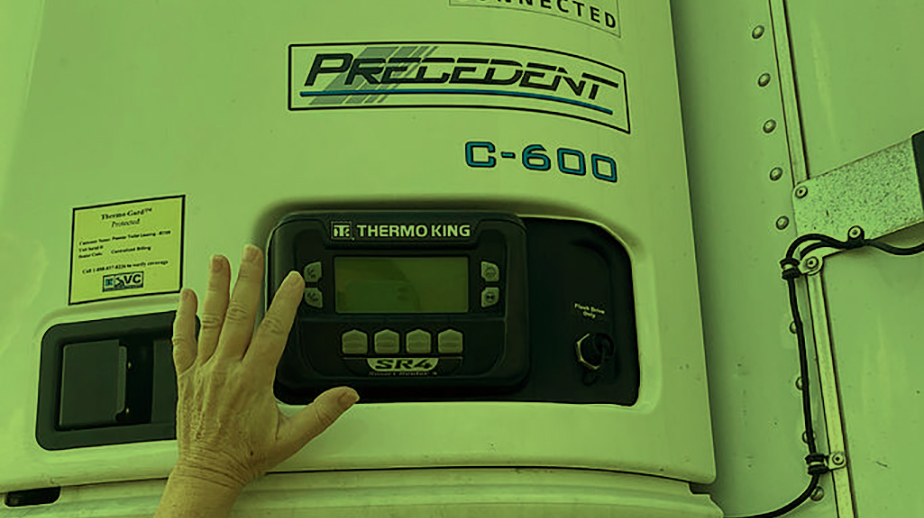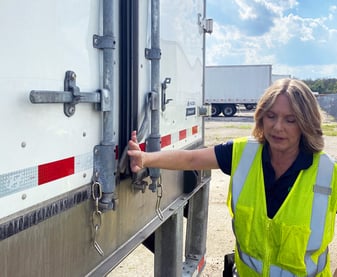By Tim Ifland, Vice President of Specialty Equipment
What do bananas from South America, fish from Novia Scotia, cantaloupes from Costa Rica, and the Pfizer vaccine have in common? They reached their customers via a refrigerated truck of some type somewhere along their supply chain. Reefer vans are an instrumental part of the worldwide cold chain. They’re also quite fragile. Mechanical or material failure, anywhere along the cold chain could mean millions of dollars of damaged cargo.
Inside this article:
(click to jump ahead)
Before the Road: Pre-Trip Inspections
Reefer Pre-Trip Checklist Download (PDF)
The performance and operation of refrigerated dry vans relies on best maintenance practices and a disciplined schedule of periodic and corrective maintenance. The refrigeration unit, practically speaking, is all contained in one cabinet. It is powered by a diesel engine, running on diesel fuel drawn from a tank mounted beneath the trailer. Over time, reefers are subject to vibration, weather, temperature, and several external forces that could compromise their integrity in some way.

Before the Road: Pre-Trip Inspections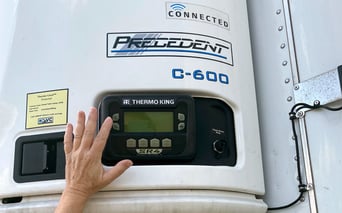
Prior to every departure, many shippers require that a self-diagnostic pre-trip be initiated on the refrigeration unit to identify any mechanical issues ahead of the trip. This check can be initiated via the control panel on the refrigeration unit, or via a two-way command prompted by a desktop or mobile application, if the unit is equipped with such technology.
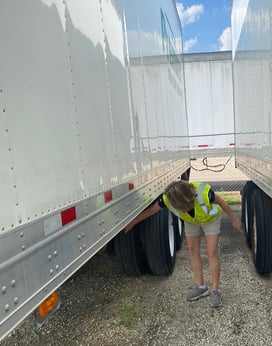 Prior to every departure, trailer reefer units should be inspected to see if there are any obvious deficiencies. Part of this ‘Pre-Trip’ routine is a physical "walk around" of the trailer. As drivers get ready for the trip, they look for anything broken, loose, cracked, or any other ways that the trailer's integrity is compromised. They inspect for any cuts that could allow water to seep in and compromise the foam, which over time could reduce the units ability to maintain set point.
Prior to every departure, trailer reefer units should be inspected to see if there are any obvious deficiencies. Part of this ‘Pre-Trip’ routine is a physical "walk around" of the trailer. As drivers get ready for the trip, they look for anything broken, loose, cracked, or any other ways that the trailer's integrity is compromised. They inspect for any cuts that could allow water to seep in and compromise the foam, which over time could reduce the units ability to maintain set point.
A visual inspection should include the outside of the trailer as well as inside. During the visual inspection it is crucial to look for any signs of moisture or water intrusion anywhere as well. Moisture intrusion can not only damage cargo, but also accelerates the degradation of any insulation.
Quick Tip: Do not forget to inspect roof cuts which will not be immediately visible.
Any cuts to any exterior panel or door, exterior sub-floor liner, interior linings, floor and/or scuff area should be repaired immediately to prevent contamination to the insulation properties of the trailer.
In addition to the visual inspection, pre-trips should also include an automated check of the internals of the refrigeration system. On the reefer unit itself is a control panel which includes a ‘pre-trip’ button. Operators should push this button before they do their visual walk around. By the time the walk around is complete, the pre-trip check will also be done, and operators will be able to see if there were any diagnosed malfunctions that it picked up. If not, the check is positive, and the trailer is good to go.
Service Center Maintenance
In addition to pre-trip checks, refrigerated units should have periodic maintenance performed by technicians at a service center or other contracted sources. Often, reefer maintenance is contracted to the equipment manufacturer.
Maintenance Schedules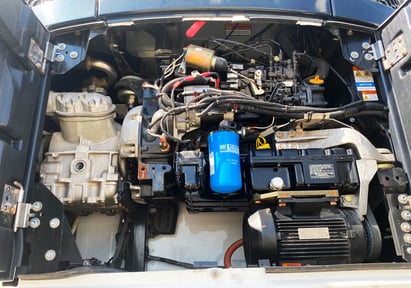
Here at Premier, we partner with manufacturer Thermo King who performs specific periodic maintenance on all reefers. An "A" series of maintenance is performed every 1500 engine run hours of service. A "B" series of maintenance is performed every 3000 engine run hours.
Other checks are performed by service technician personnel. Here, units are checked for temperature performance as well as for leaks. Checking the unit's intake air temperature in comparison to its output air temperature is a good basic check to see if the temperature differential is within specifications. This provides a good guideline that the refrigeration unit is doing its job and adequately removing heat by absorption of the circulating refrigerant.
Refrigerant suction and discharge pressures may also be checked with refrigeration gauges. The suction and discharge pressures, if not within specifications give a good guideline of the charge or refrigerant levels in the unit. Any loss of refrigerant is a deficiency and indicates there could be a leak in the system somewhere.
In order to find the precise location of a leak, an ultrasonic leak detector – sometimes called a "whistler" or "sniffer" can detect very small leaks using sound waves to detect where such leaks may be. In some cases, leaks may be repaired, but in many cases new coils or other parts of the unit will need to be replaced and recharged with new refrigerant.
Battery Maintenance
Because the refrigeration units are self-contained and diesel driven, a starting battery is required. The battery is constantly trickle charged via a solar panel. Batteries on the reefer unit are not lithium-ion batteries and do not last forever. Thus, batteries are replaced at a safe interval, long before the failure mode of the battery.
There are many different types of batteries. Some may have an electrolyte such as distilled water which must be replenished periodically. Premier uses EON batteries which use Absorbed Glass Mat (AGM) technology to offer, in one box, the characteristics of two separate batteries. It provides enormous cranking power in one durable package.
It's important to note that trailers that sit idle may result in the unit's battery not being charged at all, which will cause it to discharge. Therefore, it's important to always monitor batteries and keep them charged even if your reefer trailer sits idle. Ideally, battery charges are checked weekly, as part of the pre-trip check and supported via a top-mounted solar panel.
Fuel Levels
The most significant maintenance deficiency of the reefer unit operation we 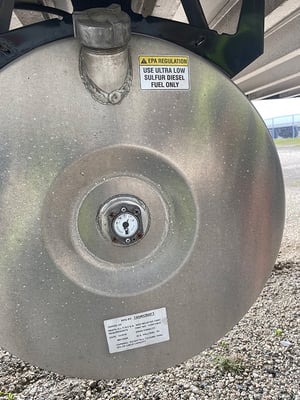 see here at Premier is surprisingly not the performance of the refrigeration unit. The number one deficiency is running out of fuel! Drivers must not only refuel their truck, but at the same time, the reefer diesel tank to power the reefer unit.
see here at Premier is surprisingly not the performance of the refrigeration unit. The number one deficiency is running out of fuel! Drivers must not only refuel their truck, but at the same time, the reefer diesel tank to power the reefer unit.
Insufficient Fuel
While telematics allows low fuel to be detected and alarms to be sent to a remote platform and to the driver's smartphone app, there are still cases where fuel runs out. Training your teams on this seemingly simple task should be a crucial component of your reefer maintenance strategy.
Fuel Clogs
In addition to low fuel or no fuel, we also often see fuel clogs. In this case the fuel system draws fuel through a fuel filter. Over time, the fuel filter, if not cleaned or replaced, clogs and obstructs its flow. Often, this goes undetected and results in the reefer not working – which is detrimental to the reefer unit and the cargo being transported. Make sure to use a quality fuel vendor because poor fuel may cause clogs (clear diesel is preferred).
Quick Tip: Recommended fuel is non-highway diesel fuel, no more than a 5% bio-grade.
Open Doors
Another common problem is that some shippers require that the refrigeration unit be left running during the loading/unloading process. That’s okay as long as the dock temperature is relatively close to the set point temperature.
However, if the dock temperature is not in-line with the set point temperature, it will suck in warm moist air which will freeze on the coil, effectually stopping the unit from cooling. To clear the ice, the unit will automatically go into defrost mode. This cycle is not only damaging to the unit, but also to the cargo, creating unsafe conditions fast.
Operators often don’t notice this cycle is happening and how turning off the reefer unit during loading/unloading while keeping doors tightly closed at all other times will fix this issue quickly.
Temperature Reporting
It's important to note that trailer temperatures are usually logged and recorded internally, but through the use of telematics, they can instantly be sent wirelessly to a remote platform. If there is ever a product recall or a case of spoiled food product that merits a recall, federal regulatory authorities will request temperature logs to review. If negligence is found, the carrier or shipper may be prohibited from transporting food or temperature-controlled cargo again and could even face fines and jail time. Ensuring easy access to reporting is therefore crucial for any reefer operation.
Air Flow
Maintaining refrigeration units properly directly impacts equipment 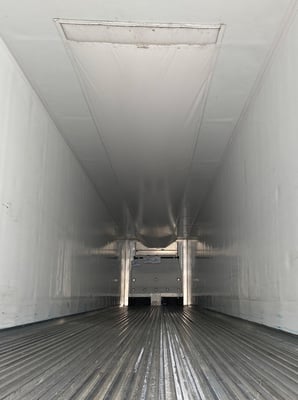 reliability and subsequently the condition of the cargo being transported, which after all, is the focus of transporting goods via refrigerated truck trailers.
reliability and subsequently the condition of the cargo being transported, which after all, is the focus of transporting goods via refrigerated truck trailers.
Beyond ensuring equipment functionality, the flow of air within a refrigerated trailer is also critical to ensure air is exchanged, and the conditioned air is distributed and homogeneous throughout the inside of the trailer. For this reason, air chutes play an important role to ensure that air is directed and conveyed to all areas around the load to help reduce hotspots and avoid rejected loads. Additionally, good air flow results in better fuel efficiency.
Other structural factors within the trailer can impact air circulation. Flat floors require the use of pallets , with the air gap of the pallet allowing air to circulate beneath the product while protecting the cargo from any moisture that could be present on the floor. Boxed cargo on the other hand requires duct type floors to ensure proper airflow and should therefore always be free and clear of any debris.
Moving the Cold Chain
Each year, billions of tons of cargo move by truck. Produce and agricultural products are more available than ever, made possible by refrigerated ships, shipping containers, cold storage warehouses, and refrigerated dry vans.
Any blip in the trailer operation may result in catastrophic failure for the carrier, shipper, and anyone else who relies on the refrigerated load to be intact upon delivery. Such reliance magnifies the importance of maintenance and urges fleet operators to place utmost importance on maintenance rigor and disciplined scheduling of maintenance. By adopting a culture where maintenance is at the forefront of fleet operations, trailers will be most ready to serve the network of transportation that moves the valuable cold chain.
 Tim Ifland is Vice President Specialty Equipment for Premier Trailer Leasing and an industry veteran. His 35 years of trailer industry experience includes branch operations, sales management, procurement, product SME/sales training, account management and branch equipment services including warranty, quality control, breakdown services, tires, maintenance and safety.
Tim Ifland is Vice President Specialty Equipment for Premier Trailer Leasing and an industry veteran. His 35 years of trailer industry experience includes branch operations, sales management, procurement, product SME/sales training, account management and branch equipment services including warranty, quality control, breakdown services, tires, maintenance and safety.
